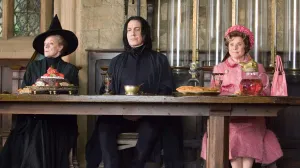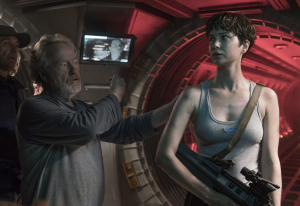
Joe and Anthony Russo, directors of Captain America: Civil War, held a Q&A session about the film last night, during which they revealed several interesting aspects at the movie’s plot, characters, and their storytelling approach.
Videos by ComicBook.com
One fan asked if they could sum up Civil War‘s ending in one word. Joe Russo offered the word “Complicated,” suggesting there may be no clear winner in the war at hand.
Another fan asked about Bucky Barnes, a key character in the film and a major motivator for best friend Steve Rogers. Will he be more like the Bucky Barnes of Captain America: The First Avenger, or is a still the titular assassin of Captain America: The Winter Soldier.
“This is another thing that we spent a long time thinking about and talking about with the writers, who have written all three Captain America movies, [Christopher] Markus and [Stephen] McFeely, so they have a tremenedous understanding of the character of the Winter Soldier, obviously,” Anthony said.
“He isn’t Bucky Barnes from the first movie,” Anthony continued. “He isn’t the Winter Soldier from the second movie. He’s a completely different version of that character. Maybe, perhaps, it’s a hybrid of the two, in some way, because how do you go from being a normal person to being a mind controlled assassin, to sort of some life beyond that?
“So that’s what we’re exploring in this film. Where is this character left at a psychological level, and how can Cap reconnect with that person, in any way, after he’s had this experience as the Winter Soldier? That’s sort of at the heart of the film, I would say, is ‘Who is Bucky in this movie?’ and ‘Can Cap ever have a relationship with him?’
Posted by The Russo Brothers on Wednesday, April 6, 2016
The Russos also addressed how the Civil War is a different kind of film from The Winter Soldier, calling the former a “psychological thriller” and the latter a “political thriller.”
“Winter Soldier is a political thriller,” Joe explained. “A political thriller usually has a complicated plot that traps the lead character, and the lead character is typically behind the plot, trying to catch up with it, and there’s a revelation moment where they finally catch up with the plot, and it’s usually around the end of Act 2. Then they scramble and defeat the villain in the third act.
“But a political thriller, like The Winter Soldier, turns on plot,” he continued. “There are very specific plot twists in the film that push the characters forward. A psychological thriller turns on the characters and the choices that they make, so this movie is more of a character film, and the key moments in this movie turn on key choices that the characters are poised to make in the film, that ultimately, as the title suggests, put them in conflict with people that are close to them, and that can be a severe conflict.”
Marvel’s Captain America: Civil War finds Steve Rogers leading the newly formed team of Avengers in their continued efforts to safeguard humanity. But after another incident involving the Avengers results in collateral damage, political pressure mounts to install a system of accountability, headed by a governing body to oversee and direct the team. The new status quo fractures the Avengers, resulting in two camps—one led by Steve Rogers and his desire for the Avengers to remain free to defend humanity without government interference, and the other following Tony Stark’s surprising decision to support government oversight and accountability.
Check out when Captain America: Civil War and other movies are coming out in ComicBook.com’s Movie Release Schedule.

Have you seen Dawn of Justice yet? If so, go rate it in the ComicBook.com Movie Database for a chance to win your very own Armored Batman figure!
Batman v. Superman: Dawn of Justice is now playing in theaters.








